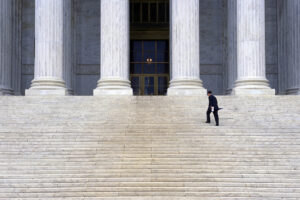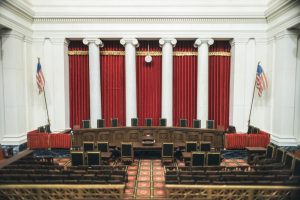This article is related to a Showcase CLE program that took place at the ABA Business Law Section’s Hybrid Annual Meeting on Friday, September 16, 2022. The program featured three experienced Supreme Court advocates as panelists: Miguel A. Estrada, Partner at Gibson, Dunn & Crutcher LLP; Nicole A. Saharsky, Partner at Mayer Brown LLP; and Seth P. Waxman, Partner at WilmerHale. All CLE programs were recorded live and will be available for on-demand credit, free for Business Law Section members.
The United States Supreme Court is a generalist court, not a business court. But a significant part of its docket affects businesses directly. The October 2021 Term, which concluded in June 2022, was no different. Although the subject matters of the business cases varied widely, some themes can be discerned in the docket.
First, the Court clearly regards arbitration as a positive part of the legal system. The Court lavished significant attention on arbitration, deciding four arbitration cases this past term. Morgan v. Sundance decided that a waiver of rights under an arbitration agreement should be treated the same as a waiver under any other agreement, without additional requirements such as a showing of prejudice. Badgerow v. Walters was a statutory construction case where, based on the language of the Federal Arbitration Act, the Court found that a federal court has subject matter jurisdiction over a motion to confirm arbitration only if there is subject matter jurisdiction over the confirmation motion itself. It makes no difference whether the underlying dispute could be subject to federal jurisdiction. Viking River Cruises v. Moriana held that, where an arbitration agreement contains a class/collective action waiver, the FAA preempts a California statute that permits private parties to sue as private attorneys general or in collective actions. Such disputes must be arbitrated rather than litigated. Finally, Southwest Airlines v. Saxon held that disputes involving airport cargo loaders are not covered by the FAA because those employees are “a class of workers engaged in foreign or interstate commerce” excluded by FAA § 1.
Statutory construction also occupied a large part of the Court’s docket. ZF Automotive v. Luxshare held that 28 USC § 1782 can be used to assist only foreign or international tribunals operating under governmental auspices. Private arbitration panels, and even treaty-based arbitrations that use non-governmental sponsoring organizations, do not qualify for § 1782 assistance. In Cassirer v. Thyssen- Bornemisza Collection Foundation, the Court held that choice of law rules for claims under the Foreign Sovereign Immunities Act are the same as in private litigation. Because one of the main exceptions to sovereign immunity is for a sovereign’s commercial activity, the effect on business is obvious.
Another statutory construction case was Hughes v. Northwestern University, which held that a customer’s ultimate control over its account is not a defense to a fiduciary duty claim against ERISA plan administrators, who have continuing duties to monitor investments. Unicolors v. H&M Hennes & Mauritz was a straightforward application of the language of Copyright Act § 411(b)(1)(A): a registration is valid even if it contains errors, so long as the registrant lacked knowledge of the inaccuracies.
West Virginia v. EPA is perhaps more difficult to categorize. In that case, the Court held that § 111(d) of the Clean Air Act did not authorize parts of the EPA’s Clean Power Plan regulations. The Court held that the regulations would have worked a major change in environmental regulation, and that such a major change must be clearly set forth by Congress. Is this more of a statutory construction case, which looked at the scope of the Clean Air Act? Or is it more of a separation of powers case, which deems major changes to existing practice to be a legislative function? Or a bit of both?
City of Austin v. Reagan National Advertising was a classification issue, asking whether the city’s rule governing billboards was a “time, place and manner” restriction that survives first amendment scrutiny, or was an impermissible content regulation. In that case, different rules applied to on-premises and off-premises signs. The Court held that the different treatment was based on location, not content.
The so-called “shadow docket” saw a split decision on vaccine mandates. NFIB v. OSHA held that the Occupational Safety and Health Administration did not have authority to impose vac- cine mandates on employees of private businesses. But Biden v. Missouri held that facilities accepting Medicare and Medicaid funds could be required to mandate vaccines for their employees.
The Court has granted certiorari in a number of important cases that will be heard during the coming term, which will start in October 2022. Among the subjects the Court will address:
- 303 Creative v. Elenis – Does a public accommodation law violate freedom of speech under the first amendment if it compels a web designer to create content for a same-sex wedding?
- Students for Fair Admissions v. Harvard; SFA v. UNC – Are race-conscious admissions in education permissible under Title VI of the Civil Rights Act and the equal protection clause of the 14th Amendment?
- Mallory v. Norfolk Southern Railway Co. – Is a state law requiring corporations to consent to suit as a condition of doing business in the state unconstitutional?
- Andy Warhol Foundation for the Visual Arts, Inc. v. Goldsmith – What is “transformative” for purposes of “fair use” exception to copyright infringement?
- National Pork Producers Council v. Ross – Does state regulation with effect outside the state violate the dormant commerce clause?









